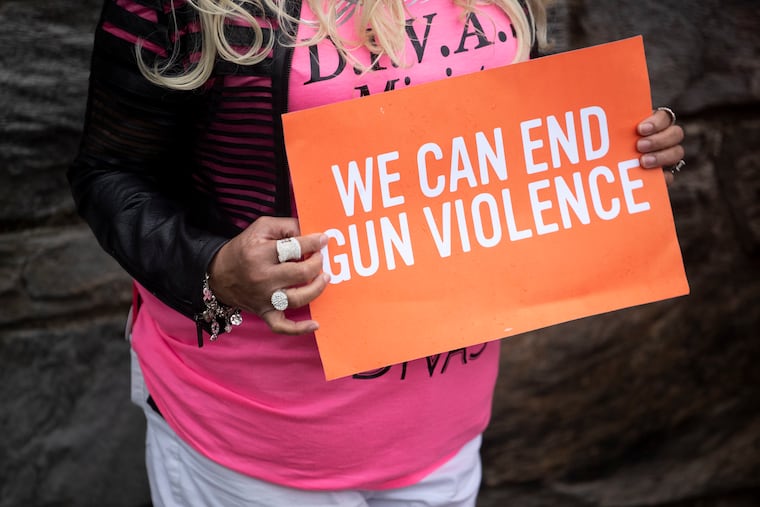Growing calls for accountability of Philly’s taxpayer-funded antiviolence programs giving me hope | Helen Ubiñas
This could be our chance to do it right, if only we can keep these calls for accountability from falling into a black hole of institutional inertia.

Scene: The Managing Director’s Office inside Philadelphia’s Municipal Services Building in the Year of our Lord 2017.
Seated around a conference table are a handful of city officials touting the first Office of Violence Prevention, and its mission to evaluate the effectiveness of tens of millions in taxpayer-funded violence prevention programs.
A grand endeavor, they boast. Long overdue, sniffs the salty columnist seated among them.
And so it shall be done! declares the bullish band of bureaucrats.
Fast-forward four-plus years, three managing directors, a revolving roster of six-figure violence prevention experts, 1,787 homicides and counting — and a drumbeat of columns calling for promised accountability, and here we are: Another city budget and another vote for millions in new spending for violence prevention.
But there’s something that’s actually new, or at least feels like it: the growing chorus of voices in and out of City Hall demanding some accountability for all that money.
Philadelphia City Council approved a $5.2 billion budget this week that included about $155 million for violence prevention.
But before we cheer too hard, consider that a big chunk of that was restored, reclassified, and rebranded funding that was already in the budget.
Still, there are millions more dollars for things like community grants and curfew centers, a safe space where kids can wait for their parent or guardian.
Even before the budget was approved, a majority of councilmembers signed a letter calling for independent outside evaluation of all programs.
“We want to take a look at our overall system to make sure the funding is being used properly,” said Councilmember Kenyatta Johnson, who is also the chairman of the Special Committee on Gun Violence Prevention.
Recently, Councilmember María Quiñones-Sánchez said many existing groups “receive and spend millions annually with no public discussion or accountability.”
Councilmember Jamie Gauthier has often noted that oversight and transparency are key to the success of prevention efforts.
During biweekly briefings on the city’s response to gun violence, officials are at least now saying tracking effectiveness is a priority.
None of this adds up to the full audit of city-funded prevention programs promised by the Office of Violence Prevention back in 2017, but soon — fingers crossed — the city will launch a Violence Prevention and Opportunity review committee. The committee will be made up of Council and mayoral appointees, including Johnson, who will decide which grassroots organizations will receive future grants.
Until we have actual results, a lot of this still sounds like what was promised around that conference table all those years ago.
But while it would be easy, and frankly, justified, to dismiss it as more empty talk, I’m skeptically hopeful.
“There does seem to be a groundswell of conversation around the need for accountability and evaluation,” Scott Charles said when I called him looking for a reality check.
Charles is the trauma outreach coordinator at Temple University Hospital and director of its Cradle To Grave program, a hospital-based violence-prevention initiative that illustrates the realities of gun violence for young people.
“I’m heartened that the funding is coinciding with calls for accountability,” he said.
No pressure, Philly, but all of the pressure because this could be our chance to do it right — if only we can keep these calls for accountability from falling into a black hole of institutional inertia.
Charles shared an interesting idea that could help: a nonprofit incubator focused specifically on violence prevention.
Picture it: a place where fledgling grassroots organizations could get support for everything from making copies of fliers for their next event to writing grants and managing their budgets. (There are so many people who are doing good work who would benefit from this.)
“All of that stuff that represents pitfalls for smaller organizations,” Charles said, “because what will end up happening is if we don’t help some of the folks getting money to succeed is that it will look like these ideas weren’t all that good, when the idea wasn’t the problem. It was all the other minutia and red tape that gets in the way.”
While I’ve long pushed for cutting off organizations that can’t prove their effectiveness, Charles is right. The reality is that smaller organizations are at a disadvantage to larger institutions that can appear a lot more impressive to city officials.
This way, everyone is fairly evaluated and held accountable.
And maybe that’s why this moment feels so different, so potentially promising.
It’s like staring at a puzzle we’ve been trying to solve for years and finally finding the missing piece.